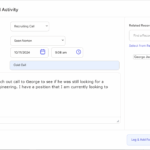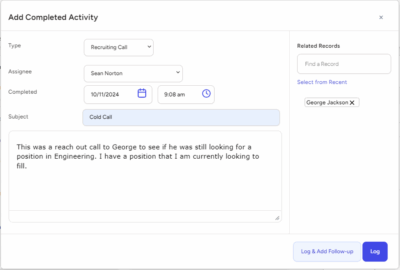As a recruiter, how do you go about qualifying the job order with the hiring manager? What’s the best approach.
You should stop the hiring manager in the middle of taking the job order and say, “I think I can help you, but let me explain to you how I work.” When the hiring manager says that they have worked with recruiters in the past, say, “Well that’s fine, but you have never worked with me, so let me explain the difference.”
Below are seven recruiter scripts for qualifying the job order:
Script #1:
“My service charge is 30% of realistic first year’s earnings. It’s not negotiable. My time is as valuable as the next guy’s—and I’ll need your OK on this today because this will be the last time we will talk about that.”
Script #2:
“I offer a 30-day guarantee. If the candidate doesn’t start to work, I will refund the service charge and, if he is terminated, or quits, in the first 30 days, I will credit my service charge toward the candidate’s replacement—and I’ll need your OK on this today because this will be the last time we will talk about that.”
Script #3:
“I recruit people who are happy, well-appreciated, making good money and currently working and I entice them to move for a better opportunity (i.e., yours, if you give me the appropriate information to conduct the search). I will not present you job hoppers, job shoppers or rejects—those who are looking at the electronic ‘want ads’ on the Internet. What this all means to you is that I won’t have resumes, so don’t ask me to send you one because it will only slow down the process and possibly cause you to miss the opportunity of interviewing my highly qualified and desirable candidates while they are available—and I’ll need your OK on this today because this will be the last time we will talk about that.”
Script #4:
“All offers need to come through me. I serve the function as a buffer and as an ombudsman during the offer process. Being utilized in this way, I can almost guarantee that an appropriate offer will be accepted—and I’ll need your OK on this today because this will be the last time we will talk about that.”
Script #5:
“I will need to take an in-depth job order. This means that we will need to set up a time for me to call you back for this activity to take place—and I’ll need your OK on this today because this will be the last time we will talk about that.”
Script #6:
“I will need to arrange a time, after the interview, to share with you candidate feedback. Because you and I are both busy businessmen, we will need to set up an agenda for this post-interview meeting so that it can proceed quickly—and I’ll need your OK on this today because this will be the last time we will talk about that.”
Script #7:
“I will need to be able to contact you in a timely manner and so will need your home phone number should the need arise to reach you after hours. Also we will need to prearrange a time when we can talk (should the need arise) on a daily basis—and I’ll need your OK on this today because this will be the last time we will talk about that.”
What do you say to hiring managers when you’re qualifying the job order? Do you use any of the scripts listed above? A combination of them? Or do you have one of your own?
Qualifying the job order is the most important part of taking the job order . . . so don’t overlook this critical step in the placement process.
— — —
Bob Marshall of TBMG International, founder of The Marshall Plan, has an extensive background in the recruiting industry as a recruiter, manager, vice president, president, consultant, and trainer. In 2016, Marshall is celebrating his 36th year in the recruiting business. He can be reached at bob@themarshallplan.org or at 770.898.5550. Marshall’s website is www.themarshallplan.org.








